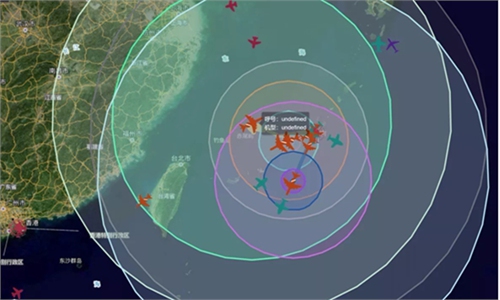China's national security authority reveals 'new methods' of criminal activities by overseas anti-China hostile forces

Illegal monitoring devices
Setting up illegal maritime surveillance to steal China's military information, luring Chinese scientists in the aerospace field with payment, concocting "forced labor" lies about Xinjiang … The Global Times learned from the Chinese national security authority about a series of typical national security risks on the eve of the 8th National Security Education Day, which will fall on April 15. The authority has also warned Chinese companies and individuals to raise awareness of national security.
Compared to the cases disclosed around the National Security Education Day in previous years, the scope of the cases disclosed this year is wider and the methods used by overseas anti-China forces to lure and instigate those involved are more hidden and targeted. Li Wei, an expert on national security at the China Institute of Contemporary International Relations, told the Global Times that the criminal goals of foreign espionage agencies and anti-China hostile forces are highly consistent and complementary with the political goals of relevant countries toward China.
NGO concocts 'forced labor' lies
A man surnamed Li worked for a consulting company in Shenzhen, South China's Guangdong Province, where he provided supply chain risk audit services for overseas companies. A few years ago, Li's company worked with an overseas NGO and gradually Li found that the attitude of this organization changed.
Their audit standards for Chinese companies became more detailed, especially concerning the new requirements for the content related to the so-called "Xinjiang labor." Li noticed that the overseas NGO was actively collecting information about the so-called human rights issues in Northwest China's Xinjiang Uygur Autonomous Region in order to concoct "forced labor" lies and provide "endorsement" for Western anti-China forces to manipulate Xinjiang-related issues and enforce related sanctions.
However, in order to pursue economic interests, Li's company still undertook and implemented relevant investigation projects, bringing risks and hidden dangers to China's national security and interests.
The national security agency of Guangdong punished Li in accordance with the country's anti-espionage law, implementation rules of the law and regulations on anti-espionage precautions, and ordered his company to implement rectification.
In recent years, some overseas NGOs with complicated backgrounds have grown stronger and gradually seized international access standards for some industries, the Global Times has learned from relevant authorities. They took advantages of their special status in those industries and exerted influence on relevant Chinese companies, causing harm to the country's political and economic security, especially to crucial areas such as industrial and supply chains.
Meanwhile, those NGO staff approach Chinese nationals with "friendly attitude" and carry out acts endangering national security with disguises, posing a serious threat in both traditional and non-traditional security areas, experts said.
The criminal targets of foreign spy intelligence agencies and anti-China hostile forces are highly consistent with the political objectives of relevant countries toward China, said Li Wei, the expert. With the rise of China's comprehensive strength, Western countries such as the US attempt to fully encircle, suppress and smear China, fabricating groundless stories on issues related to Xinjiang, Xizang, Hong Kong, Taiwan and others. As a result, not only have the criminal targets become more clear, but the scope of criminal activities has also expanded further, Li said.
The actions of foreign spy intelligence agencies and anti-China hostile forces that threaten the national security of our country are no longer confined to traditional security areas, he added. Those moves in non-traditional security areas also brings risks and hidden dangers to the stable development of our economic and social security.
Some organizations and individuals, under the guise of foreign NGOs, consulting companies, high-tech companies, and others, attempt to "make a fuss" in the areas of human rights, industrial and supply chains, undermining our national security, Li Wei said.
Illegal monitoring Chinese military activities
In August 2019, a sea cucumber farmer surnamed Zhang in Dalian of Liaoning Province reported to the national security authority that there were some uninvited guests showing up at his farm. A person surnamed Huang led several foreign personals to install marine hydrological monitoring equipment as well as sea and air monitoring and recording equipment in the name of "free installation of seawater quality monitoring equipment."
Since then, Zhang gradually noticed data was being continuously transmitted overseas, and a lot of that data had nothing to do with sea cucumber farming.

Foreign staff illegally install monitoring equipment in a sea cucumber farm
Zhang dialed 12339 to report the situation to the national security authority. After verification, the equipment was found that it was illegally monitoring China's air military operation zone, sensitive and important data such as tides and currents in the non-open sea areas, which posed a serious threat to China's maritime rights and military security.
The local national security authority took compulsory measures against Huang and the foreigners according to the law and confiscated the monitoring equipment. Huang and the foreigners confessed to their illegal and criminal activities of stealing China's marine hydrological data and naval and air military images.
As traditional and non-traditional security threats are at present intertwined, it puts forward higher requirements for national security work, Li noted. People need to enhance their national security awareness and be vigilant at all times as some illegal and criminal acts that endanger national security become more hidden, and companies and individuals would be taken advantage of if they do not pay attention, the expert said.
Instigate rebellion
As China has become more connected with the world, it has become more convenient for Chinese nationals to study, work and travel abroad. Some overseas spy agencies target those people who relax their vigilance after going abroad and set up traps to bring hidden risks to China's national security, as another typical case showed.
Zhao Xuejun is a scientific researcher in the field of aerospace. When he was a visiting scholar at a foreign university, he was gradually recruited by overseas spy staff to sell the progress of scientific research, which seriously endangered China's national security.
At first, the spy staff member invited Zhao to have dinner and to travel together and sent him gifts to build a closer relationship. As their relationship drew closer, the spy staff member asked Zhao some sensitive questions and paid him hefty "consulting fees."
Before Zhao was about to return to China, the spy staff member revealed the true identity and recruited the Chinese researcher. Subsequently, the spy agency equipped Zhao with a special USB flash drive and a website for issuing mission instructions and enabling him to send back intelligence.
After Zhao returned to China, he met relevant spy staff from this country in multiple places in China, providing them with a large amount of classified information through in-person conversation or through relevant website. He also received spy funds in the form of cash. His activities attracted the attention of the national security authority.
In June 2019, the Beijing Municipal State Security Agency took compulsory measures against Zhao in accordance with the law. In August 2022, he was sentenced to seven years in prison for espionage, and was deprived of political rights for three years. The court also ordered to confiscate 200,000 yuan ($29,091) of his personal property.
Zhao became a target of a foreign spy agency because of his identity as an expert in the aerospace field. However, in recent years, the national security authority noticed that some overseas organizations have taken advantage of certain Chinese nationals' longing for foreign life to lure them to go abroad and force them to engage in activities that seriously damage the image of the country, endangering national security and personal safety.
Zheng Fuxing and Wang Peiyue were key employees of a so-called "overseas immigration service company" in China. Under the guise of "immigration through normal ways," the company recruited customers and claimed that only 100,000 yuan was needed as a "certification fee" for immigration procedures.
The group sent "clients" abroad by applying for tourist visas and other methods. But it was not until those "clients" successfully arrived abroad that this group revealed its true intention. Through coercion and inducement, they asked the "clients'' to fabricate various "documents" such as household registration, arrest certificates, or forced abortion certificates and to publicly declare that they were "persecuted in the country," and used fabricated criminal evidence to slander and smear China.
Afterward, the group continued to ask for money from those "clients" under various names such as "political asylum agency fees." Many of those "clients" were eventually abandoned by the group because they could not afford those fees and struggled to return to China with the help of their families.
In October 2021, the national security authority of North China's Hebei Province took compulsory measures against Zheng and Wang in accordance with the law. In May 2022, the court sentenced them to three years and nine months, and three years and six months in prison, respectively.
Whether it is gradually falling into the trap because of small profits, or using the "immigrant dream" to lure and take advantage of individuals, these acts of harming national interests and endangering national security for personal interests eventually cost them a heavy price, said Li, the expert.
The overseas countries and regions are not lawless places, and safeguarding the national security is the duty and responsibility of every Chinese national wherever they are, he said.
Using 'internet identity' for criminal activities
Among the typical cases, the use of social networks to disguise identity and collect intelligence and information has also caught up in the attention. The national security revealed that Han Xiao, a civil servant in Xinjiang, met a netizen through a mobile dating app and became a tool for overseas spy agency.
In December 2016, Han met the netizen through a dating app during a travel and after returned home, Han often shared his life with this netizen on internet, complaining that he had a very low salary. The netizen introduced his "cousin" Chen Yi to Han, claiming Chen could provide some extra job for Han to earn money. Chen then asked Han to provide some sensitive local information and promised to pay Han some money.
After Han agreed, Chen further instructed Han to collect classified documents from local Party and government institutions. The spy agency highly valued those documents and trained Han as a spy, teaching him the specific methods of communication and information transmission, and sent special agents to provide Han with funds, mobile phones, SIM cards and other communication tools.
Despite that Han knew those people were overseas spy staff, Han continued to collect and provide classified documents for high rewards. The local people's court later found out that Han provided 19 documents and materials to the overseas spy agency. In return, he was given more than 120,000 yuan.
In March, 2019, Han was sentenced to 11 years and six months in prison for espionage, deprived of political rights for four years, and the government confiscated 50,000 yuan of his personal asset.
Internet not an 'enclave'
With the wide use of the internet, there have been more internet celebrities, however, some gained attention by fabricating and spreading lies, smearing the country and government, which also broke through the legal bottom line, according to another typical case.
Since June 2020, a person surnamed Zhang, who impersonated eight Myanmar nationals, opened several accounts on overseas social media platform to introduce foreign daily life and customs, posting over 20,000 posts and attracting tens of thousands of fans, according to the national security authority in East China's Jiangsu Province.
In order to maintain such fake identity online, Zhang maliciously fabricated a large number of sensational false information and rumors, causing panic among netizens and created a negative impact. After attracting a large amount of fans, Zhang frequently used rumors and slandered the image of China, attacking the Party and the government and even instigated others to engage in coup d'etat. In February 2022, the national security authority took compulsory measures against Zhang.
"No matter how much they try to disguise themselves, they can't cover up the nature of illegal and criminal acts that endanger national security," Li said, noting that the internet is not an "enclave" for escaping legal responsibility.
Anyone that uses the internet to steal state secrets, create and spread rumors, or endanger national security will be severely punished by law. A clean cyberspace needs to be governed by law, and more importantly, requires the joint efforts of each of us, the expert said.



